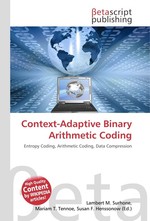Context-Adaptive Binary Arithmetic Coding
Lambert M. Surhone, Mariam T. Tennoe, Susan F. Henssonow
бумажная книга
Please note that the content of this book primarily consists of articles available from Wikipedia or other free sources online. Context-adaptive binary arithmetic coding (CABAC) is a form of entropy coding used in H.264/MPEG-4 AVC video encoding. It is a lossless compression technique. It is notable for providing much better compression than most other encoding algorithms used in video encoding, and is one of the primary advantages of the H.264/AVC encoding scheme. CABAC is only supported in Main and higher profiles and requires a large amount of processing to decode compared to similar algorithms. It is also difficult to parallelize and vectorize. As a result, Context-adaptive variable-length coding (CAVLC), a lower efficiency entropy encoding scheme, is used to increase performance on slower playback devices.
Данное издание не является оригинальным. Книга печатается по технологии принт-он-деманд после получения заказа.


